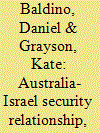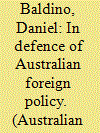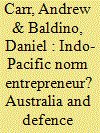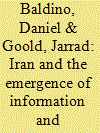|
|
|
Sort Order |
|
|
|
Items / Page
|
|
|
|
|
|
|
| Srl | Item |
| 1 |
ID:
175656


|
|
|
|
|
| Summary/Abstract |
While the Australia-Israeli relationship encompasses a cordial bilateral comradeship, it has not been without diplomatic skirmishes that have tested its reputation and strength. In particular, controversial intelligence liaisons coupled with recurring security-related scandals pose significant risks and challenges to Australian national interests. This article will explore the rationale, execution and hazards of the Australia-Israel intelligence relationship from an Australian perspective. When dealing with intelligence exchange across nations and information sharing with allies that might entail both formal and informal arrangements, it is argued that transparency and secrecy can co-exist when reconciled through robust, independent and well-resourced national oversight institutions. In an era of expanding globalisation of intelligence, targeted accountability advances that are adaptive to global trends may serve to mitigate the potential costs and downsides of transnational intelligence exchange while respecting the rights and liberties of citizens and ensuring that sovereignty, human rights standards and rule of law remain protected.
|
|
|
|
|
|
|
|
|
|
|
|
|
|
|
|
| 2 |
ID:
143920


|
|
|
|
|
| Summary/Abstract |
The practice of military-to-military engagement has been strongly embraced in the last few decades as a central tool for strategic management. Many governments in the Asia-Pacific, including Australia, have accepted the practice as an instrument of statecraft to achieve comprehensive strategic outcomes: as a means of defusing tensions, reducing hostility and shaping the behaviour of states towards each other. This article examines Australia's broad approach and practice, and argues that such transformative ambitions are overstated. The evidence suggests that the benefits from defence diplomacy are evident at the tactical and operational level. It is a mode to deal with precise and immediate security issues, as opposed to the moulding of major strategic settings. This indicates the need to better recognise the limitations and conceptual flaws of defence diplomacy, and to reformulate Australian defence channels and related engagement prescriptions towards a more cautious, pragmatic and ultimately security-related stance. Through the use of case-study analysis, this research identifies both opportunities and constraints in conducting defence diplomacy, while offering guidelines for its future implementation in the region.
|
|
|
|
|
|
|
|
|
|
|
|
|
|
|
|
| 3 |
ID:
170405


|
|
|
|
|
| Summary/Abstract |
While interrelated issues and challenges can only expand, the study of foreign policy in Australia is not a very healthy discipline. While not wholly wedged on life-support, there are genuine grounds for concern about the decline of Australian foreign policy (AFP) as a subject for serious academic concentration and its position as a marginalised topic of analysis. Unfortunately, attempts to reinvigorate the field continue to contend with a number of ingrained biases. AFP can be incorrectly dismissed as muddled and marginal while major debate points in the field are often glibly portrayed as broadly settled. This is despite the that fact that it can provide unique insights into policy-making in the twenty-first century while teaching students the benefits of problem-solving through a multi-disciplinary lens. Additionally, there is an ever-changing, contested set of knowledge that future leaders will need to consider in order to be successful, critical thinkers in a multi-agency environment. This will continue to incorporate an evolving variety of significant issues that constitute both conventional and unconventional threats to national interests.
|
|
|
|
|
|
|
|
|
|
|
|
|
|
|
|
| 4 |
ID:
138231


|
|
|
|
|
| Summary/Abstract |
The Indian Ocean is a region of increasing importance, with booming economic opportunities, shifting power dynamics and rising geopolitical competition. To manage this transition some Australian policy-makers are advocating the practice of defence diplomacy as a mechanism to help mould cooperative practices and to build regional trust while dissipating potential or ongoing regional flashpoints. Australia’s 2013 Defence White Paper identified Australia as an agent who can play a critical part in the emergence of certain types of norms as a means of conflict prevention and crisis management in the Indo-Pacific region. This paper explores the use of defence diplomacy as a means for seeking regional influence. It uses an innovative new framework of norm entrepreneurship to examine the choices facing Australian policymakers in increasingly complex security environment. This paper argues that while Australia should aim to promote defence diplomacy as a central part of rising security dialogue and practice with ‘like-mined’ countries, there must also be careful reflection to ensure that this objective is a constructive use of a middle power’s limited resources and influence.
|
|
|
|
|
|
|
|
|
|
|
|
|
|
|
|
| 5 |
ID:
127345


|
|
|
|
|
| Publication |
2014.
|
| Summary/Abstract |
This study examines the emergence of information and communications technology (ICT) in facilitating political protest in the Middle East, with a focus on the Iranian experience. With the rise of 'emancipating technology' to mobilise popular support, many had hoped that the incumbent regime in Iran would be steered towards a more democratic and less authoritarian path. At the same time, the Iranian regime itself has shown an increasingly sophisticated technical nous, constructing a centralised censorship network and using available technology to proliferate propaganda and control and subdue cyber-protest. As such, ICT has acted as a complex dual-edged sword in both mutually supporting and suppressing political activism in modern-day Iran.
|
|
|
|
|
|
|
|
|
|
|
|
|
|
|
|
| 6 |
ID:
161460


|
|
|
|
|
| Summary/Abstract |
The Indian Ocean Rim (IOR), with nearly half the world's population by 2050, in geo-political terms, is moving away from being identified as the ‘Ocean of the South’ to the ‘Ocean of the Center’ and the ‘Ocean of the Future’ with a core position in terms of global security, data collection and information transfer that will increasingly shape the planet in the twenty-first Century. Given such interdependencies, there is clearly a need for intelligence acquisition, data analysis and the provision of relevant and timely information to help to facilitate coherent, clear-eyed decision-making. It can be argued that a nation without intelligence is like an individual without eyes and ears – intelligence which no single country can gather, process or disseminate on its own.
|
|
|
|
|
|
|
|
|
|
|
|
|
|
|
|
|
|
|
|
|